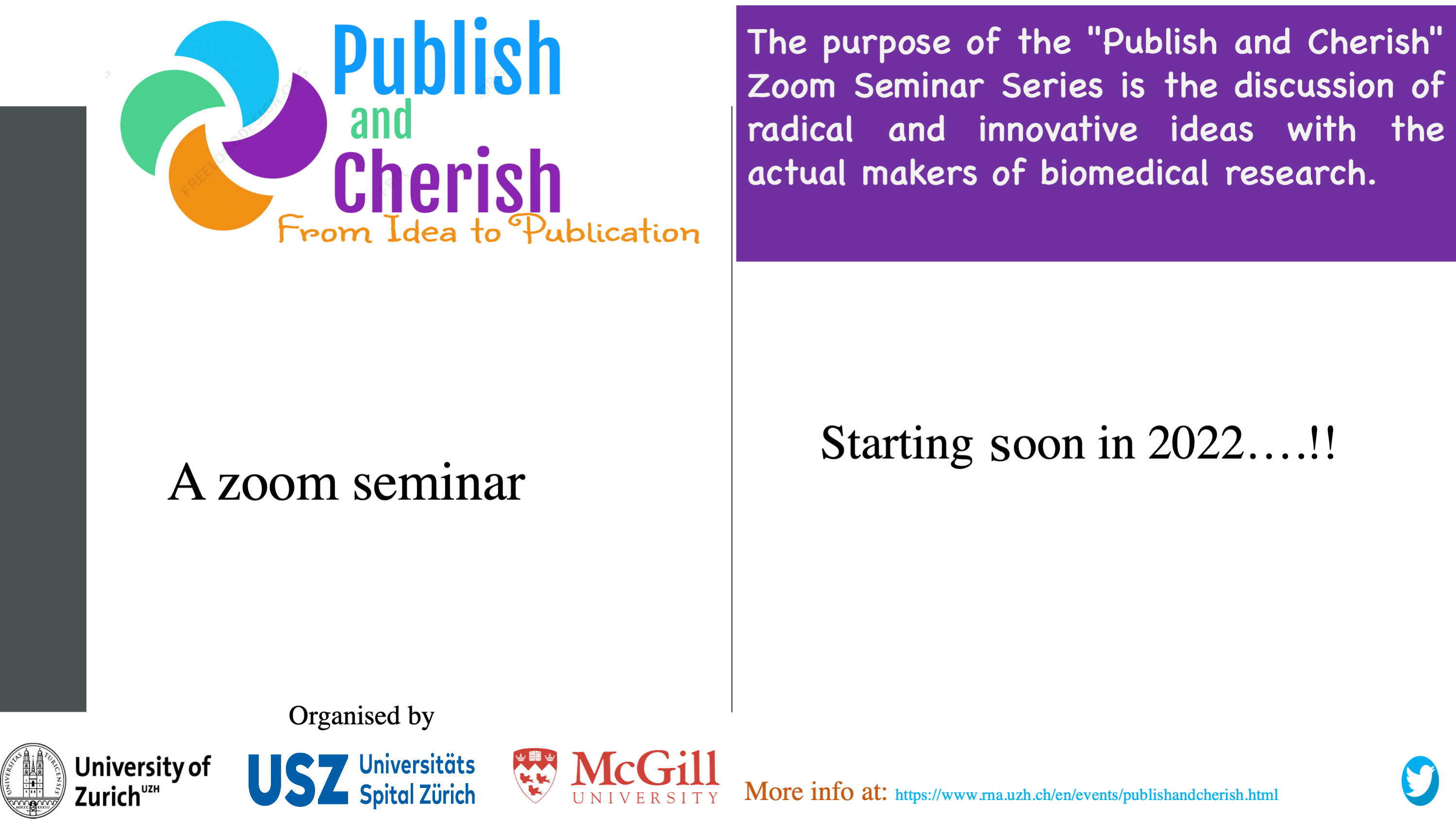Publish and Cherish
The purpose of the "Publish and Cherish" Zoom Seminar Series is the discussion of radical and innovative ideas with the actual makers of biomedical research.
We are interested in hearing from first authors of scientific biomedical publications to learn about their area of research, but also about how their projects developed over time:
- How did they come up with the project idea and to what extent did they modify the aims of the study?
- Which technical issues and setbacks did they encounter and how did they resolve or circumvent them?
- How did the publishing process go and how did they respond to the reviewers’ comments?
In addition to the exciting findings which they published, authors are encouraged to include failed experiments, artifactual data, and fun lab anecdotes.
Schedule 2022/2023
| Date & Time | Speaker |
Title |
|---|---|---|
| 12.07.2023 | Madhuvanthi Kannan (University of Minnesota Medical School, USA) |
Dual-polarity voltage imaging of the concurrent dynamics of multiple neuron types |
| 12.04.2023 | Ashutosh Dhingra (German Center for Neurodegenerative Diseases, Tübingen, Germany) |
Drug screen in iPSC-Neurons identifies nucleoside analogs as inhibitors of (G4C2)n expression in C9orf72 ALS/FTD |
| 15.02.2023 | Melissa E. Murray (Department of Neuroscience, Mayo Clinic Jacksonville, USA) |
Global neuropathologic severity of Alzheimer’s disease and locus coeruleus vulnerability influences plasma phosphorylated tau levels |
| 15.01.2023 | George Chao (Department of Genetics, Harvard University, USA) |
helixCAM: A platform for programmable cellular assembly in bacteria and human cells |
| 16.11.2022 | Sofia Lovestam (MRC Laboratory of Molecular Biology, Cambridge, UK) |
Assembly of recombinant tau into filaments identical to those of Alzheimer's disease and chronic traumatic encephalopathy |
| 26.10.2022 | Giovanni Pascarella (RIKEN, Japan) | Recombination of repeat elements generates somatic complexity in human genomes |
| 21.09.2022 | Anne-Laure Mahul-Mellier (EPFL, CH) | The process of Lewy body formation rather than simply alpha-synuclein fibrilization, is one of the major drivers of neurodegeneration |
|
24.08.2022 16:00 EST |
Bryan Copits (Washington University of Medicine in St. Lewis, USA) | A photoswitchable GPCR-based opsin for presynapting inhibition |
Schedule 2020/2021
| Date & Time | Speaker | Title |
|---|---|---|
|
26.05.2021 16:30 CEST |
Marco Jost (University of California, San Francisco, San Francisco, CA, USA) | Titrating gene expression using libraries of systematically attenuated CRISPR guide RNAs |
|
12.05.2021 17:00 CEST |
Jimena Andersen (Stanford University, Stanford, CA, USA) | Generation of Functional Human 3D Cortico-Motor Assembloids |
|
26.04.2021 16:30 CEST |
Andrew Yang (Stanford University School of Medicine, Stanford, CA, USA) | Physiological blood–brain transport is impaired with age by a shift in transcytosis |
| 17.03.2021 16:00 CET | Emanuela Pasciuto (VIB-KU Leuven) | Microglia Require CD4 T Cells to Complete the Fetal-to-Adult Transition |
| 03.03.2021 16:00 CET | Zeynep H. Gümüş (Icahn School of Medicine at Mount Sinai) | Interactive, visual exploration of massive -omics datasets |
| 17.02.2021 16:00 CET | Elvira Mass and Frederic Geissmann (Memorial Sloan Kettering Cancer Center / University of Bonn) | A somatic mutation in erythro-myeloid progenitors causes neurodegenerative disease |
| 03.02.2021 15:00 CET | Francesco Simone Ruggeri (Wageningen University / University of Cambridge) | The Influence of Pathogenic Mutations in α-Synuclein on Biophysical and Structural Characteristics of Amyloid Fibrils |
| 08.12.2020 16:00 CET | Kalil Alves de Lima | Meningeal γδ T cells regulate anxiety-like behavior via IL-17a signaling in neurons |
|
25.11.2020 16:00 CET |
Leah Houri-Zeevi | Three Rules Explain Transgenerational Small RNA Inheritance in C. elegans |
|
10.11.2020 16:00 CET |
Ting Zhou | IL-18BP is a secreted immune checkpoint and barrier to IL-18 immunotherapy |
|
30.10.2020 16:00 CET |
Elisabetta Babetto | A glycolytic shift in Schwann cells supports injured axons |
|
20.10.2020 14:00 CET |
Ruslan Rust | Nogo-A targeted therapy promotes vascular repair and functional recovery following stroke |
